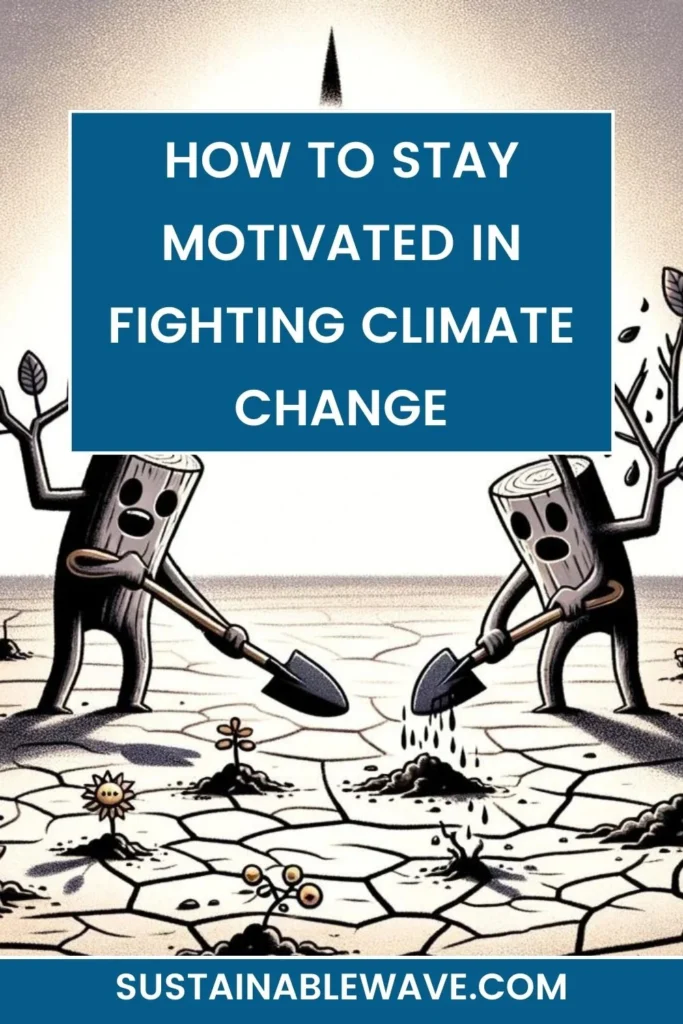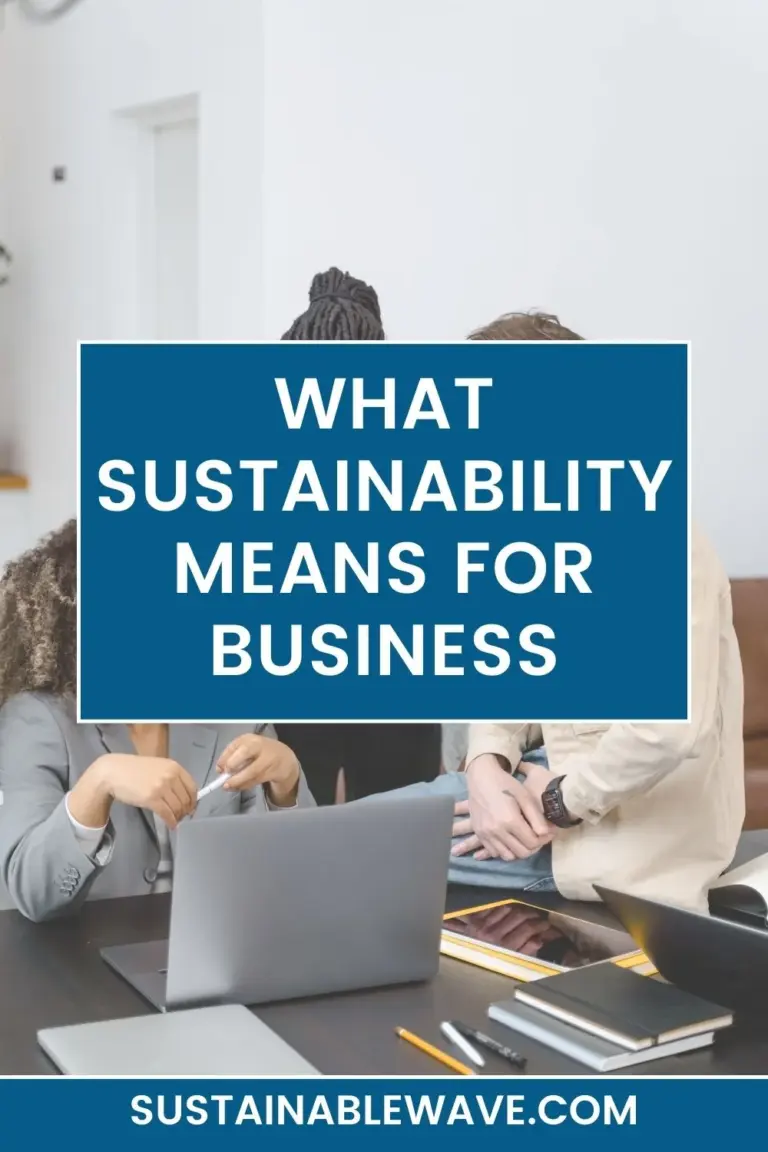In an era where the drumbeat of negative climate news seems relentless, maintaining the momentum to fight climate change can feel like an uphill battle.
The constant influx of dire predictions and worsening environmental indicators can transform even the most passionate environmental advocate into a pendulum—swinging between bursts of enthusiasm for learning and action, and the weighty despair of wondering, “What’s the point?”
This emotion is a shared experience among many who strive to make a positive contribution in the face of an overwhelming crisis.
So how do we find the motivation to persevere on the days when optimism seems futile, and the task at hand insurmountable?
How to Stay Motivated in Fighting Climate Change

Small Lifestyle Changes
Embracing small lifestyle changes is a foundational step towards making a significant impact on our environment.
For instance, prioritizing local purchases not only supports community businesses but also reduces the carbon footprint associated with long-distance transportation.
Similarly, opting for walking or cycling for short commutes can dramatically decrease one’s reliance on fossil fuels, enhancing both personal health and environmental quality.
Moreover, the adoption of reusable shopping bags, alongside diligent recycling and repurposing efforts, embodies a conscious shift towards reducing waste.
This reflects a deeper understanding of our role in the consumption cycle and its effects on the planet.
Transitioning away from products laden with harmful chemicals, like CFCs, further illustrates the power of informed consumer choices in driving positive environmental changes.
These seemingly minor adjustments to our daily routines can cumulatively lead to significant ecological benefits, underscoring the importance of individual contributions to the broader sustainability movement.
Educational Engagement
Staying informed and engaged with educational content is crucial for sustaining motivation and effectiveness in the fight against climate change.
Listening to impactful speeches and reading insightful books can provide a wealth of knowledge and inspiration. For example, exploring literature that highlights global progress and solutions to pressing environmental issues can reframe the narrative from one of despair to one of hope and action.
Moreover, engaging with platforms that share success stories and conservation achievements can serve as a constant reminder of the positive change happening worldwide.
This approach fosters a sense of optimism and responsibility, encouraging continuous learning and participation in environmental conservation.
Education, in this context, becomes a tool for empowerment, enabling individuals to make more informed decisions and advocate for sustainable practices more effectively.
Community Involvement
Active participation in community-driven environmental initiatives represents a powerful avenue for amplifying individual efforts.
Joining local environmental groups or engaging in conservation projects can lead to meaningful changes in policy and practice.
Activities such as planting community gardens or organizing clean-up events not only improve local ecosystems but also strengthen communal bonds and raise public awareness about environmental issues.
Furthermore, collaborating with others to support or oppose specific legislation can have a profound impact on environmental governance.
This collective action underscores the importance of community in the environmental movement, highlighting how shared goals and cooperative efforts can lead to significant improvements in sustainability.
Engaging at the local level provides a tangible sense of achievement and progress, reinforcing the belief that together, we can make a difference in combating climate change and protecting our planet for future generations.
Sustainable Practices
Adopting sustainable practices is not just about making environmentally friendly choices; it’s about integrating sustainability into every aspect of our lives.
For instance, reducing meat consumption can significantly lower one’s carbon footprint, considering the resource-intensive nature of animal agriculture. Even small adjustments, like opting for meatless meals a few times a week, can have a profound impact on reducing greenhouse gas emissions.
In addition to dietary changes, choosing to upcycle and thrift rather than purchasing new items can reduce waste and support a more circular economy.
This approach not only lessens the demand for new products but also challenges the fast fashion industry and its environmental repercussions.
Moreover, incorporating sustainable transportation options, such as biking to work or using public transport, can dramatically decrease individual carbon emissions.
These practices highlight a commitment to living in harmony with our environment, demonstrating that sustainability is not just a concept but a lifestyle.

Mindset and Perspective
Maintaining a constructive mindset and perspective is critical in the ongoing battle against climate change.
Recognizing that feeling overwhelmed at times is part of the process allows for a healthier approach to environmental activism. It’s essential to understand that while the challenges are significant, despair and inaction serve no purpose.
Instead, focusing on what can be done within one’s capacity and celebrating small victories along the way can foster a more resilient and proactive attitude.
This includes acknowledging the importance of self-care and the fact that it’s okay to take breaks. By doing so, we can sustain our efforts over the long haul without succumbing to burnout.
Embracing a mindset that values progress over perfection can motivate us to continue making positive changes, no matter how small.
This perspective encourages a more forgiving and realistic approach to personal and collective environmental goals, fostering a sense of hope and possibility in the face of adversity.
Political and Social Action
Engaging in political and social action is paramount for effecting systemic change in environmental policy and practice.
Voting for leaders and policies that prioritize the environment sends a clear message about public priorities and can shift the political landscape toward more sustainable governance.
Additionally, advocating for stronger environmental regulations and supporting initiatives that aim to reduce pollution and protect natural habitats can lead to significant legislative changes. This level of engagement demonstrates the power of collective voice and action in shaping a more sustainable future.
Moreover, participating in social movements, whether through peaceful protests, community organizing, or online activism, can amplify the urgency of our environmental crisis and mobilize public support for critical issues.
By taking a stand, individuals can contribute to a larger movement that seeks to address the root causes of climate change and work towards a more equitable and sustainable world.

I’m Thomas, the owner of SustainableWave. Passionately promoting a sustainable planet. With experience in various eco-roles, I’ll share green tips, sustainability hacks, and personal eco-journeys on my blog.






